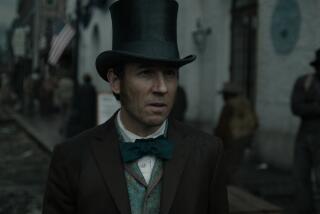Little Details, Great Men
- Share via
One of the best reasons for artificial anniversaries like Presidents Day weekend -- besides, of course, the chance to market linens, tires and cars at blowout sale prices -- is the opportunity to remind ourselves that these mythological figures we share as a nation were once mere men. George Washington, Abraham Lincoln and others walked and talked among their countrymen free of the forced folderol we now attach to high elected office and the endless campaigning to get there.
Academics can savor history’s revealing details. How, for instance, the Battle of Waterloo was delayed by Napoleon’s kidney stone attack, enabling Prussian troops to arrive in time to help the British. For most of us, however, history’s characters remain two-dimensional, confined to correct quiz answers and myth. The favorite food of our Revolutionary War hero and premier president, for instance, was actually regular bread soaked in warm milk, perhaps a silent comment on his hand-carved wooden false teeth.
With photography in its infancy, the photo op hadn’t been invented by 1860, permitting the election of a bearded lawyer named Lincoln, who preserved the Union and freed the slaves despite being gawky and unphotogenic. On the day he was elected the nation’s 16th president, Lincoln worked quietly in his office. Heedless of evening news deadlines, the towering attorney walked through a modest crowd into the Springfield, Ill., courthouse at 3 p.m. With a pocketknife, he modestly cut his own name from the ballot before voting a straight party ticket and awaiting returns at the telegraph office.
We now know this and much more from a glorious website -- https://dev.stg.brown.edu /projects/lincoln. There, the Illinois Historic Preservation Agency has assembled the details of this intriguing figure’s entire life, 1809-1865, searchable by date, year, subject. We see the country lawyer’s court filings, including the 1841 divorce of an Ann and Patrick McDaniel; the day he bought socks and, later, boots for son Tad, the 1864 telegram he sent his wife, “All very well.” One day with his old-fashioned eloquence he romantically reminded a nervous pre-wedding pal about his betrothed’s beautiful eyes. Then Lincoln dispatched an autograph to a Charles Ulrich, whose son collected them.
Perhaps simple things form soothing lessons as we enter the noisy fray of a presidential election’s more modern mayhem and myth-making. Four days after his 1860 election, Lincoln appeared at a victory rally and refused to speak: “I could say nothing I have not already said.” Then he went to the pharmacy for a tonic and some hair balm.


